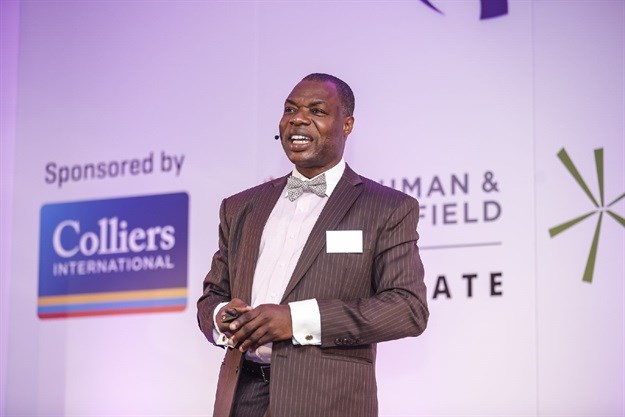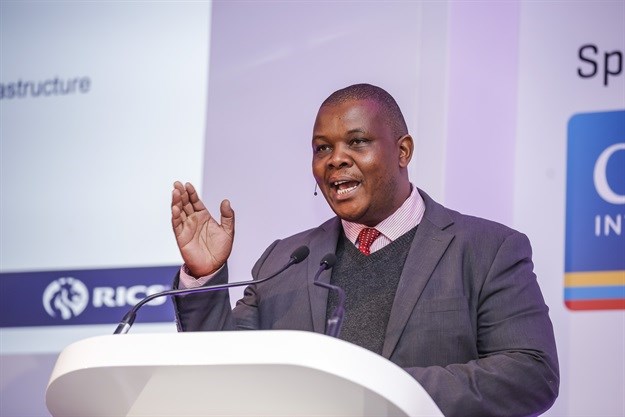Better urban planning and massive investment in infrastructure is needed to cater for the influx of people looking for job opportunities, higher salaries and urban lifestyles in Africa’s burgeoning cities.

Delivering the opening keynote address, Bennet Kpentey, chief executive and managing consultant at Ghanaian-based Sync Consult Management Consultants, highlighted the rapid pace of urbanisation in Africa.
Kpentey said: “Cities in Africa with more than a million people increased from 52 in 2011 to 65 in 2016. This rate of urbanisation is on par with Europe and higher than India and North America.
He added: “With 40% of the population living in cities, Africa is more urbanised than India (30%) and almost at par with China (45%). By 2030 Africa will have 760-million urban residents, increasing to 1.2-billion by 2050 according to the African Economic Outlook 2016 report.”
Kpentey said while Africa’s rapid urbanisation presented infrastructure challenges for its major cities, this was also a sign of a prospering continent. “Africa has a young population with a growing labour force and is expected to have the world’s largest working-age population of 1.1-billion by 2034… Household consumption in Africa grew at a 4.2% compound annual rate between 2010 and 2015, while the McKinsey Global Institute forecasts Africa’s household consumption will reach $1.4tn by 2020 and $2tn by 2025. The African Development Bank predicts that by 2060, about 1.1-billion Africans will be in the middle-class. Most of these African’s will be residing in the continent’s cities.”
Kpentey said with Africa’s upward mobility, high urbanisation and continued economic growth, there was an increased number of mega infrastructure projects in Africa. However, he said the continent needed to accelerate infrastructure development through innovative means such as public-private-partnerships.
Speaking on the availability of land for urbanisation, Emeka Eleh, principal partner of Ubosi Eleh and Company in Nigeria, said massive urbanisation has seen people scrabbling for space in the country’s biggest city, Lagos. This has resulted in a rise in slums as urban planners in the city struggle to develop infrastructure and plan ahead to deal with millions of people descending on Lagos.
“The challenge is that urbanisation in much of Africa takes a life of its own, with regulators not being pro-active enough by planning ahead. Urban areas are key to economic growth, and it is important for cities to be planned and managed to deal with rapid urbanisation. Not planning for urbanisation, will mean higher infrastructure development costs and other challenges,” he said.
Eleh added: “Lagos is Africa’s most populace city with between 18-20-million people and growing at about 3.2% annually. One of the initiatives that have come about as a result of the city’s urbanisation challenges is the development of new cities on the outskirts of Lagos on reclaimed land, such as Eko Atlantic City. In fact, the bulk of development in Lagos currently is taking place on reclaimed land, which is helping us deal with our urbanisation and land challenges.”

In his keynote address at the RICS Africa Summit, Jacob Mamabolo, Gauteng MEC for Infrastructure, said as the economic powerhouse of Africa, Gauteng was attracting about 300,000 people annually from the rest of South Africa and other African countries. He said the rollout of infrastructure in the province was no easy task, given that Gauteng was the most populace province and continued to attract more people.
“We have prioritised infrastructure investment in Gauteng… In the last three years – between 2013 and 2016 - Gauteng’s infrastructure investment amounted to R30bn. This translates into an average annual growth rate in infrastructure spending of 20.7% – the fastest growth rate for any province in the country,” said Mamabolo.
He added: “Over the next three years a further R42bn will be spent on infrastructure in Gauteng, while nationally almost a trillion rand will be invested in infrastructure… The benefits of prioritising infrastructure spending cannot be underestimated.”

Speaking at the summit, RICS president Amanda Clack, who is also partner at EY and head of Infrastructure (Advisory) for the UK and Ireland, said by investing in core infrastructure, governments were ensuring the economic future of a country and its cities.
“Infrastructure investment is vital to supporting rapid urbanisation and creating the world’s future cities. The world is facing an infrastructure funding gap of $57tn until 2020. Infrastructure investment has the power to drive social change, create jobs, support businesses, improve the environment and create a better world in which to live,” she said.
Clack said: “Today, the global urban population is 54%. In 2050, the UN predicts that the global population will be nine billion, with 66% living in urban centres. That’s 6.3-billion people living in cities. With rapid urbanisation, cities are taking on greater importance and need to deliver infrastructure to accommodate growing populations and attract talent and investment.”
She added that RICS’ position in sub-Saharan Africa is that of an international body fitting into the jigsaw of local built environment associations. “In the face of increased urbanisation and to meet growing infrastructure needs, the region must attract investment capital from across national and continental boundaries.”
Clack said, as a consequence, there was a greater worldwide demand for international standards and the professionals who can work to them. These help to create consistency and trust in markets.
London-based RICS is a global professional body that promotes and enforces the highest qualifications and standards in the areas of land, real estate, construction and infrastructure. As a public benefit organisation, it operates in all the world’s major financial hubs in delivering international standards and policy influence.
The 2017 RICS Africa Summit was sponsored by Colliers International, Cushman & Wakefield Excellerate and the Green Building Council of South Africa, and supported by the International Facilities Management Association.